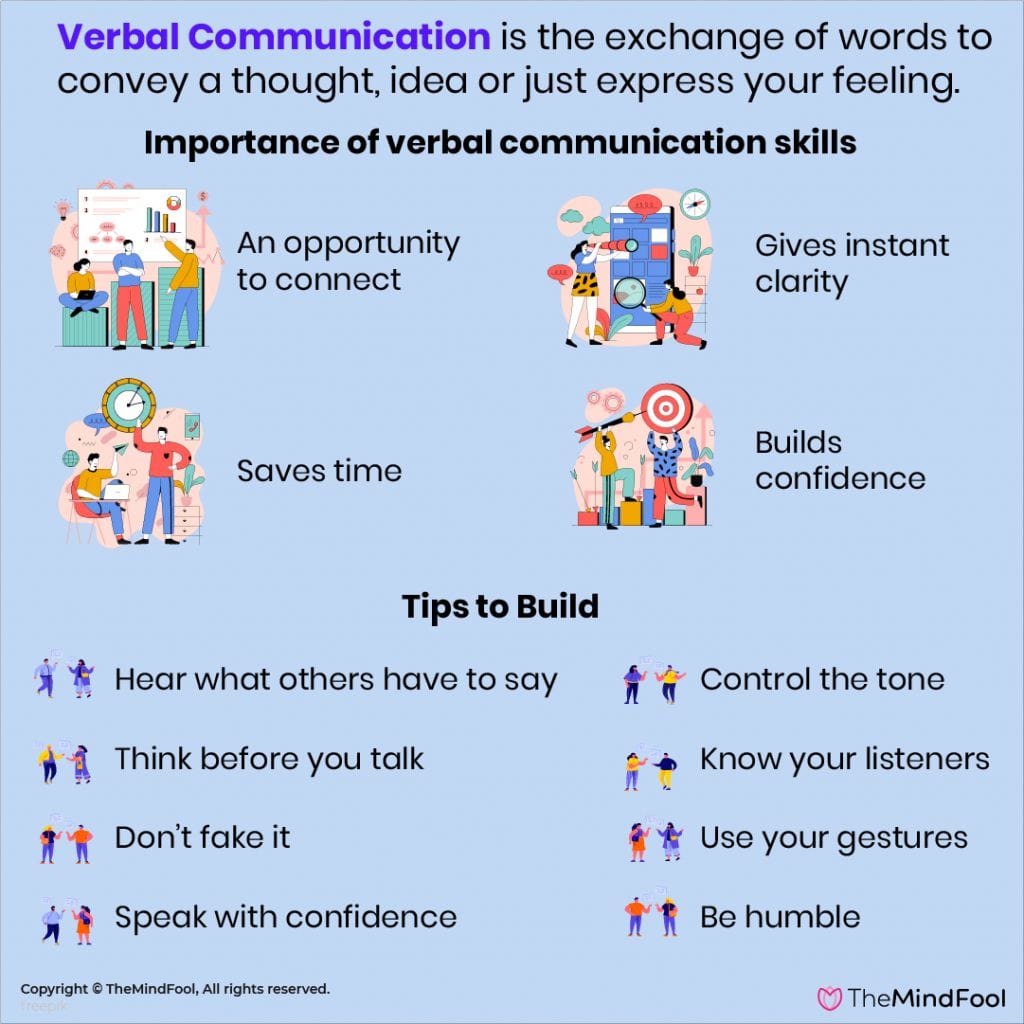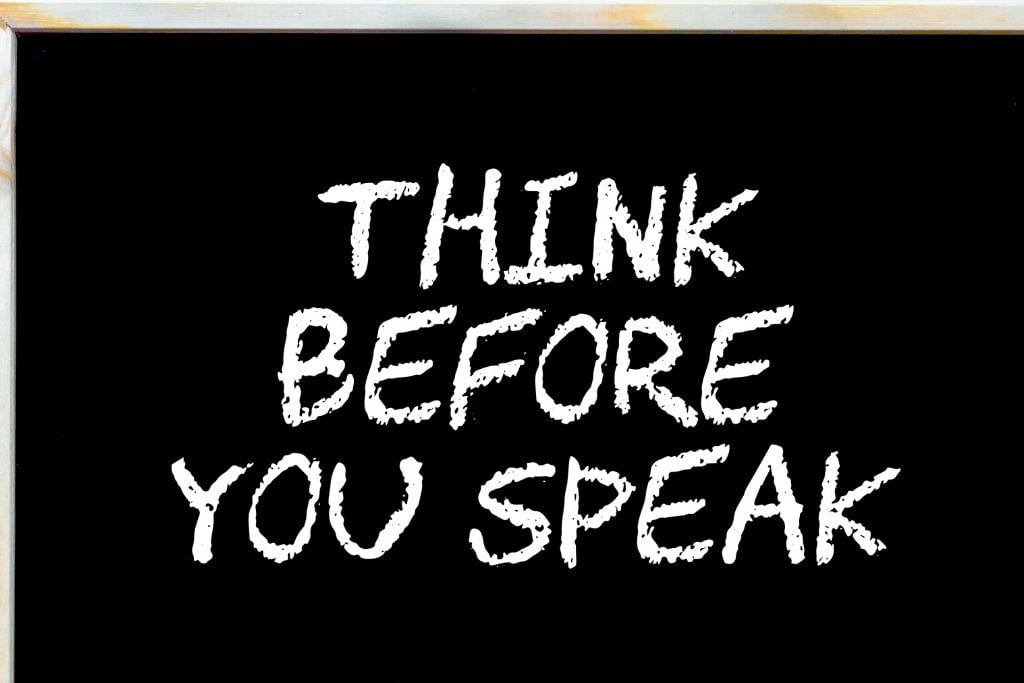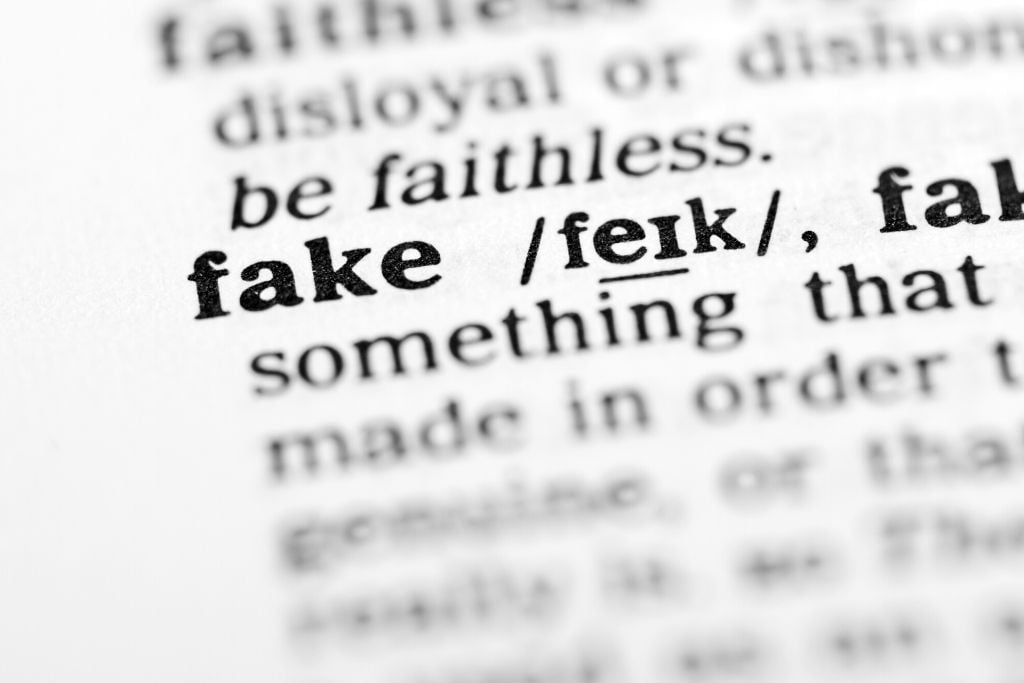
Have there been instances when the other person’s ability to communicate has swept you off your feet? For instance, you are interviewing a candidate for a position in your team. The candidate may not match the qualification criteria but the conversation that you have managed to convince you to recruit them. Think about it, what made the interviewer change their decision and hire the person on the other side. Very simply, it was the other person’s verbal communication skills.
The way you present yourself which primarily includes your body language and your interpersonal skills or your ability to communicate with others, plays a crucial role in building your personal brand. Interestingly, this brand value reaps rich benefits on the personal as well as professional front. Therefore, communication skills are important. Else you are likely to be ignored on most of the occasions in your life!
Summary in Infographics

What is verbal communication?
Every day, we all have so much to speak about. This is our oral communication. From exchanging greetings to having arguments, what we say makes a whole lot of difference. This is where your verbal communication skills come into play. In the simplest of terms, verbal communication is the exchange of words to convey a thought, idea or just express your feeling.
But don’t be fooled because this is not the only way one can communicate. Your non-verbal skills like the body language, facial expressions, active listening etc. also play a very important role in deciding the fate of your conversation.
What happens if your verbal communications skills are not up to the mark. This is the next likely question that may be bothering you. Well, simply put, if your verbal communication skills are not good, you will never see the required impact of your conversation on the intended recipient. For example, if you can not convey the benefit of your idea to your boss, the likelihood of the organisation implementing it is very poor.
At the end of it, any communication is a two-way process. So, if your communication does not have the intended impact, there could be a fault at the recipient’s end. May be the recipient was not paying attention or listening to what was being said.
Importance of verbal communication skills
In today’s technology driven world, one may often underestimate the importance of communication. With emails and messages, you may feel, what is the need for face to face conversations. But, this is not entirely true.
There are times when only verbal communication can successfully convey your point. For instance, if there is a tragedy and you want to convey your condolences, it is better to give it in person than just send a message. The message will never be able to convey your emotions.
Here are 5 reasons why verbal communication is important:
1. An opportunity to connect
Verbal communication presents an opportunity to connect with the people. It gives you a chance to build your rapport and reputation with the person. This connection takes longer to establish when you are working with messages, emails and other technical means.
2. Gives instant clarity
With verbal communication, there is one guarantee – if you have doubts you can quickly ask questions and get your answers. You can easily understand what the other person has to say. In person meetings with people allows you to observe their body language and understand their motive in a better way.
3. Motivation at its best
Verbal communication is also a great way to motivate your recipient. Encouraging words from someone can make you feel good. This can be a great way to help the other person push their limits and achieve more.
4. Saves time
When you opt for verbal communication, it helps you save time. You can explain your objectives in a better way and resolve queries as well.
5. Builds confidence
When you express ideas verbally and the other person expresses interest in it, it helps you build your confidence as well. It actually helps you transform into better individuals.
What is good verbal communication skills?
Good communication skills involve a lot of things. We are born with vocal cords. Everything – from the baby cooing to the baby burping, is an attempt to communicate. As we grow older, we learn to speak words. Good verbal communication skills are extremely useful on the personal and professional front. From effective listening to speaking and adapting, the gamut of good verbal communication skills is spread far and wide.
Here is a look at the 7 basics of good verbal communication skills:
1. Good listening skills
Like we pointed out earlier, verbal communication is a two-way street. In order to make sense of the conversation, it is important to hear what the other person has to say. First things first, be prepared to listen when you are sharing ideas. Most of us, invest all our energy in deciding what we are going to say and how we will say it. Also learn to focus on the overall message instead of worrying about one or two points that do not suit you.
2. Use encouraging words
For others to show interest in your conversation, it is important to reinforce your ideas and encourage them to participate in your discussions. How can you do this? Well, the answer is simple. Just use positive encouraging words in your conversation. This will help the other person develop interest in your conversation. They are likely to be active contributors.
3. Questioning
Encourage people to ask questions. This ensures clarity of conversation. Questions test your understanding about the subject and encourage the other person to participate.
4. Rectifying
The core purpose of asking questions or encouraging others to participate in your conversation is to clear concepts. There is a possibility that you may come across feedback. A key to building good verbal communication skills is to learn to take this feedback and improve your ways.
5. Summarizing
Good verbal communication skills means that you should never leave a conversation hanging. When both parties are done speaking, one of them should summarize the discussion. This way everyone can be on the same page.
6. Closing comments
A conclusion is crucial to a good verbal communication. And no this conclusion does not mean that the discussion has ended. The conclusion is just a way to reinforce the key takeaways from the discussion so far.
7. Adapting
You may have a certain agenda in mind for your conversation. But when you come to speak, the situation / circumstances could be different. You may need to adapt your conversation according to the situation. For example, if you are all prepared to argue but you realize the other person has already accepted your point, you need to modify the tone and content of your conversation.

Types of verbal communication
Speaking is an excellent way to communicate your thoughts. But there are various types of verbal communications. Broadly this can be classified into four categories:
1. Intrapersonal communication
This is often the communication that we have with ourselves. In this situation, our mind has to often juggle between being the sender and the receiver of thoughts.
2. Interpersonal communication
This is one of the basic forms of communication where two people interact with each other. You will be required to swap roles with the receiver. The swapping of roles is important to ensure clearer communication.
3. Small group communication
The interaction with a group of people like a broad meeting or a press release with a select group of reporters. Here there is one sender and multiple receivers. The number of people in this group is small but individual interaction is often not possible. The result is that such communication can often get extremely chaotic.
4. Public communication
In this form of communication, one individual usually addresses a large gathering of people. A good example of this situation is the leader addressing an election rally. This communication usually results in an agenda being conveyed repeatedly to convince the receivers.
Verbal communication at work
Our professional interactions take up a large chunk of our life. The way we interact at our workplace defines the roadmap of our career. After all, you would rarely come across a successful leader who has horrible verbal communication skills. The role of communication at the workplace goes beyond just conveying ideas.
You need to make presentations, conduct interviews, teach your subordinates, etc. There is just so much to do in every professional role. Effective verbal communication is like the thread that holds your thoughts and aligns them with the overarching goal of achieving growth for your organization.
Every conversation at the workplace has to be focused on building productive relationships with superiors and coworkers. This helps in working efficiently as a team. Any conversation at a workplace depends on three factors:
- The situation in which the conversation is happening
- The professional relationship with the people involved
- The reason of the conversation
A good employee is expected to thoroughly evaluate all these factors and accordingly adopt the best possible communication technique. Additionally, there are always situations when you need to rely on special communicative skills like tough negotiations, exit interviews, etc.
Verbal vs non verbal communication
Verbal communication is all about using words to convey your thoughts. The secret to successful verbal communication is to respect the other person’s opinion. But we communicate through much more than words and this is where non verbal communication comes into the picture.
Here are the key differentiators between the two types of communication:
- Verbal communication is clear but non verbal communication is more of guess work.
- The probability of the message getting misunderstood is higher in non verbal communication
- In order for non verbal communication to be successful, both parties need to be physically present. This restriction is not there in case of verbal communication.
- Non verbal communication is time consuming as it involves studying and understanding various factors.
- Non verbal communication helps to understand the other person’s emotions and feelings. This gives a better insight into the message being communicated.
Types of non verbal communication
Here is a look at the various types of non verbal communication:
1. Chronemics
This involves the use of time to communicate the message in non verbal communication. It gives the receiver a fair idea about the senders personality and speed of speech.
2. Vocalics
In this type, one focuses on the tone used to communicate the message. This gives an insight into the emotion.
3. Heptics
This area talks about the use of touch in any communication.
4. Kinesics
The use of body language in the attempt to communicate. This includes elements like facial expression.
5. Proxemics
The use of distance to communicate. For example, an intimate communication is very different from a professional one.
6. Artefacts
This is the study of appearance of the individual while attempting to communicate.
However, each type of communication has its own advantages. For example, the deaf communicate through non verbal communication extensively. Therefore, it is ideal to look at both as complementing each other.
Verbal communication examples
Here are some examples of verbal communication :
- Meeting : This is a good example of verbal communication. The purpose of meeting is to get together and share your ideas. In a professional environment like sales pitches, one needs to decide the frequency of these meetings. If you are on tight deadlines, meeting daily can help.
- Presentations: Most businesses convey their ideas and strategies through presentations. This type of verbal communication relies on clear messaging, room for feedback and of course the use of visual aids to convey the point.
- Conveying condolences: This type of communication needs to be subtle. You need to empathize with the person who has experienced the loss. As you give your condolences, the tone of your communication should be reassuring to pull the other person from his /her grief.
- Disciplining: Trying to discipline your children or coworkers can also be considered an example of verbal communication.
- Recognition: Crediting others for their good work. Communicating with them to congratulate them and lauding their efforts.
- Termination : Terminating individuals or a contract is a great example of practicing verbal communication skills in the best possible way.
- A few other examples in this category can involve encouraging people to share information, request feedback, etc.
20 Tips to Build Your Verbal Communication Skills
1) Hear what others have to say

SUMMARY
No, we are not asking you to be submissive and follow everything that the other person says. But, there is no harm in hearing them out, is there?
Not many people realize that in order to be able to communicate effectively, it is important to listen properly. Active listening is an art that most people tend to ignore when it comes to learning effective verbal communication. However, if you are looking to improve your verbal communication skills, you need to be a good listener. Pay attention to what other people are saying.
This will help you understand their viewpoint and accordingly put your thoughts together. Not listening to what the other person has to say, is telling them that they have nothing worth saying. Imagine how would you feel if someone told you that? Frustrated and insulted, right? You wouldn’t want anyone to feel that way, would you?
2) Be friendly

SUMMARY
If you are not friendly, most people will assume that you are not approachable. This means no one would ever come to you to strike a conversation. And so, your verbal communication abilities will never develop.
Being friendly does not mean that you need to intrude on other people’s space and be a part of every conversation that happens around you. Instead, your body language has to indicate that you are approachable.
So, no one will hesitate when it comes to approaching you. Simple things like wearing a smile on your face or greeting people politely are one of the best ways to break the ice when people around you try to approach you for a conversation.
3) Think before you talk

SUMMARY
Wise folks always ask us to put thought into our actions. Apply this thought to your soft skills as well and life will change for the better.
We just told you about the power of listening. The whole idea to emphasize the art of listening is to help you understand. Once you are able to understand what is being said, you will be able to string your thoughts together and say something sensible. Simply put, think before you speak. It will ensure that you are able to convey your thoughts/opinions in a more effective way.
4) Be clear

SUMMARY
The simple trick to ensure effective communication is to keep it clear and concise. Avoid beating around the bush.
Your communication will be effective when you are able to understand what the other person is saying. Of course, this involves investing a fair bit of your emotional energy into what the other person is saying but it helps.
For instance, many of us remember Winston Churchill as a great leader and an extremely effective communicator. However, there are people who tend to hint at possibilities instead of conveying the impact clearly, each time they communicate. This only adds to the confusion in the conversation. In today’s technology-driven age, coming up with a big idea is not enough. You should be able to communicate clearly. Simply put, spending time to figure out the simplest way to put your thoughts through is always advisable.
5) Don’t fake it

SUMMARY
Fake interactions are never fruitful, particularly during face to face conversations. Ideally, you should present your authentic self in any communication.
Effective communication skills are important but no two people will show the same traits. This does not mean that you start aping others (if you like their communication skills). Instead, you should try to adapt them to your way of communicating. Avoid putting up a show, to prove your point.
You should instead work on collating your thoughts and backing up your point with substantial evidence. This way, the other person will readily accept what you have to say.
CAUTION
It is easy to detect a fake conversation because the topic that you are discussing will lose fizz gradually. Therefore it is advisable to keep the facts straight forward and attempt a meaningful conversation if you want to gain anything out of the time invested.
6) Speak with confidence

SUMMARY
If you want the world to trust you, start by being confident. If you are not confident about what you are saying, there is no chance that you will be able to convince the person on the other side.
Communication skills are important. They help you build rapport. But all of it only starts with you being confident about what you are saying.
Simple indicators of this confidence come from things like the tone of your voice, maintaining eye contact during a conversation, your facial expressions, etc. For instance, if you are confident about what you are saying, maintain eye contact with the person while speaking.
Another way to convey this confidence is to speak calmly. Why try to rush through it when you don’t doubt the impact? Give the other person a fair chance to voice their opinion and don’t run away from answering questions. This will build trust in the conversation and make your communication more effective.
TIP
If you experience some amount of nervousness while striking a conversation, take short pauses between sentences. This will give your brain a chance to calm down and before you know it, the anxiety would be gone.
7. Be Assertive
If you do not believe in what you are saying, it is likely to have minimal impact on the person receiving the information as well. A key to ensuring successful verbal communication is to assertively state your point.
8. Control the tone
When you want to make a point, you need to learn to modify the tone of your communication at different stages during the conversation. For example, you should start with an assertive tone but mellow it down a little midway to encourage people to share their views.
9. Learn nonverbal communication
Effective communication requires you to understand the non-verbal cues as well. Therefore, spending some time to understand these cues is a good idea.
10. Restrict use of visual aids
Relying on visual aids is good but only to a certain extent. You can’t expect these aids to compensate for the point that you intend to make. Various organisations have banned visual aids like powerpoint presentations to encourage employees to sharpen their verbal communication skills.
11. Timing is crucial
What you want to say is important but when you say it is also equally important. Choose the right time to present your points and the possibility of it being accepted automatically becomes higher.
12. Know your listeners
It is always good to know about the people that will be at the receiving end of your communication. Knowing about them allows you to modify your tone, approach and other factors. This guarantees a stronger impact of the point that you are trying to make.
13. Get comfortable
Verbal communication is not easy. It can often make you nervous. You need to get accustomed to the idea of speaking and expressing your views. This will help you express your thoughts confidently. You can do this by reading out loud.
14. Write what you want to say
Sometimes attempting verbal communication directly is difficult. So start by writing down what you intend to say. Pen down the key pointers and use them to develop your conversation.
15. Watch movies
Sometimes entertainment can be extremely helpful when it comes to building your verbal communication skills. There are some fantastic movies that can help you improve your linguistic skills.
16. Debate and discuss
Do not get it wrong, no one is asking you to start arguing at the drop of the hat. But look for opportunities to engage in debates and discussions. This gives you a platform to express your views and learn from others.
17. Use your gestures
A straight forward speech delivery is not an effective way to communicate. Use your hands and your body language to reiterate your point. This creates a positive impact.
18. Be in control
When we are nervous, we tend to fumble. This also leads to a situation where the listeners lose interest in your conversation. Do not let this happen. Keep yourself calm as you deliver your thoughts. This helps in avoiding the unnecessary fumble.
19. Be humble
A conversation is best started with humility. Irrespective of the knowledge that you have, stay humble, willing to receive feedback and criticism. This will help you improve your verbal communication skills.
20. Practice
Last but not the least, you need to keep practicing to improve your verbal communication skills. Remember the change does not happen overnight, it will require a lot of practice from your side before it becomes perfect.
Parting thoughts from The MindFool
The process to improve your verbal communication skills is the one that involves constant learning. You learn from people around you every time you have a conversation. Improving this skillset takes time but given its impact, it is totally worth the effort.
Verbal Communication Skills FAQs
What is verbal communication skills?
Verbal communication skills is your ability to communicate an idea or a thought to the other person. These skills consist of two things : your ability to speak (choice of words and tone of voice) and your body language when you speak.
Why are verbal communication skills important?
You may have a great idea but if you are not able to convey it accurately, there is a high possibility that it may get ignored. Effective verbal communication skills are your ability to put together your thoughts and make sense of what you speak.
What are 5 examples of verbal communication?
There are many verbal communication skills examples available. Some of them are:
1) Giving feedback
2) Voicing your opinion or your thoughts
3) Interacting with friends/family
4) Presenting an idea / project in your office
5) Seeking feedback from your seniors
Why verbal communication is effective?
The effective verbal communication skills involve conveying your thoughts along with your facial expressions that make the conversation more meaningful. Interestingly, verbal communication gives you a chance to convince the person on the other side more easily because the wait for a response is eliminated.
What are the activities to improve verbal communication?
Here are some simple activities to improve your verbal communication skills:
1) Learn to think before you speak
2) Keep the conversation clear and concise
3) Be polite
4) Learn to listen to the other person as well
5) Maintain a positive body language
A freelancer by profession, Kavita writes on a variety of topics, mental health being one of her favorites. Fond of traveling, socializing and meeting new people, most of her inspiration for writing comes from real-life scenarios as well as experiences. Her motto in life has always been to look for a reason to smile.
